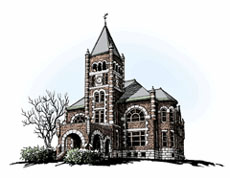 |
 |
| current issue |  |
past issues |  |
send a letter/news |  |
address update |  |
advertise |  |
about us |  |
alumni home |
The View from T-Hall
Research in the Public InterestBy President Ann Weaver Hart

When i began my career in higher education in the mid-1980s, I was a faculty member in the educational administration department at the University of Utah. There my time was divided between the classroom and my own research, which focused on leadership succession in schools.
I wanted to find out how schools handled changes in leadership, and I wondered how the change process could be managed to produce the best outcome for the students, the school staff and the new administrator. Most of the books and articles I wrote on that subject were published some time ago, but I still receive inquiries and "testimonials" from people who find my work useful as they prepare for transitions in leadership at their schools.
I mention my own example as just one illustration of the way academic research engages scholars in issues important to the larger community. You'll find other examples in every issue of UNH Magazine. For instance, read this issue's article about Stephen Calculator's work on a new communication technique for people with Angelman syndrome. Here are a few more examples of UNH research that makes an immediate difference to our neighbors in New Hampshire.
As director of the Adolescent Resource Center, a university-state collaboration, Kristine Baber works to improve the health and well-being of adolescents in New Hampshire. The center conducts research and provides information about issues affecting adolescents to professionals, policy makers, parents and young people throughout the state. Dr. Baber chairs the Family Studies Department in the School of Health and Human Services, which is committed to this kind of engaged scholarship, exemplified by the Child Study and Development Center, the Marriage and Family Therapy Clinic and the Family Connection Project.
Michael Gass, a professor in the Department of Kinesiology and coordinator of the university's outdoor-education program, is one of the nation's leaders in experiential education. Currently, he is working with the New Hampshire Department of Education on three different initiatives to improve teaching in grade schools and high schools. He is conducting research, developing curricula and performing evaluations on service-learning and character-education programs at every grade level from kindergarten through high school. He is also helping school superintendents in the North Country find new ways to attract, train and retain excellent teachers. "While a great deal of our work informs practice, much of it also creates practice," he says.
Barbara Krysiak, an associate professor in the education department, studies leadership in schools--and she knows her subject from a personal as well as a scholarly point of view. She was a school superintendent for many years before joining the UNH faculty. Dr. Krysiak directs Project Mentor, a program that selects undergraduate men and women to serve as tutors and mentors for boys and girls in three middle schools. The project helps middle school students to become more proficient in mathematics and science, and it motivates them to start planning and preparing for their post-secondary education.
Faculty members also engage in their communities across disciplines and in teams. One example can be found in the Math and Science Partnership group, which includes faculty and staff members from many departments, including mathematics and statistics, education, chemistry, mechanical engineering, the UNH Impact Center, the Marine Extension Program, physics, plant biology, natural resources and New Hampshire Public Television. For the past decade, this interdisciplinary team has been finding ways to improve mathematics and science education at every grade level throughout the state.
I am tremendously proud of these faculty members and of the students who work side-by-side with them. As I said in my inaugural address, "The knowledge we discover and the actions we take eventually become public property, creating a public good." Much of the hard work of practice-based research goes unrecognized, because it usually takes place out of the public view, but the questions that UNH researchers ask and the answers they reveal make life better for New Hampshire families every day. ~
blog comments powered by Disqus

